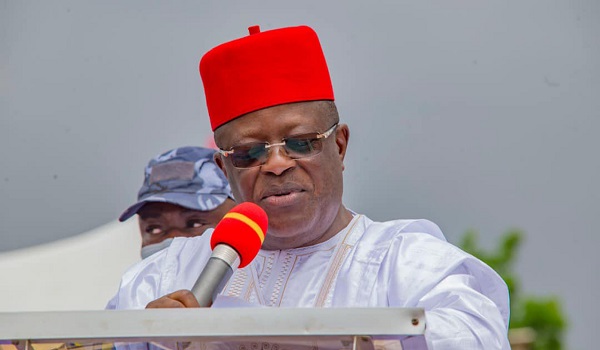The Nigerian Government has warned contractors against the use of laterite as a base for road construction across the country.
Instead, the government wants contractors to use lumps, sharp sand, and stone for base before they lay concrete or asphalt pavement on Federal roads.
The Minister of Works, Senator Dave Umahi gave the order at the inauguration of the committee for the supervision of the reconstruction of Benin-Warri dual carriageway and the dualisation of East–West Road, Port Harcourt – Onne Port junction Road in Rivers State.
Umahi also warned that contract variation would no longer be taken with levity at the Ministry.
Read also: Bandits in trouble as Nigerian government declares them terrorists
Straightnews gathered that laterite is incompatible with many modern building techniques, high-rise buildings cannot be built due to low strength, is less resistant to natural forces like earthquakes and rainfall difficult to withstand heavy rainfall due to high moisture retention and is prone to acidic leaching.
In a statement on Friday, October 6, 2023, by Blessing Lere-Adams Director (Information) Press & Public Relations Unit, Federal Ministry of Works (FMW), Umahi noted that laterite has a limited load-bearing capacity, susceptible to erosion and weathering, especially in areas with heavy rainfall and this can lead to degradation of the road surface over time, maintenance challenge and does not last long.
The statement reads in part: “We are giving very serious attention to the roads between Benin and Warri. The road between Eleme and Onne Port, we are mindful of the site conditions of these roads, the water conditions, and the boreholes instead of potholes on these roads. No more laterite, contractors are now to use lumps, sharp sand, and stone base in place of laterite”
“The Minister directed the newly inaugurated Road Taskforce Team that there must be a continuous maintenance of all the roads under construction until the end of the project and should make sure that the contractors are duly informed of the development, and that they should remember that the ministry is under the matching order given by Mr. President to fix Nigerian roads for the citizens to have ease of movement from one location to the other.
Read also: Umahi’s Political Menopause?
“The committee must implement the contract agreement with maintenance culture as key. Committee members are to monitor the contractors closely to make sure things are done right.
“Our contractors can now understand that we are not insisting that things have to change without a reason, but that the society is demanding the sustainability and integrity of the work they are doing”.
“Umahi disclosed that road infrastructure is one of the key factors for the revolution of our commerce, education, security and power in this country and that Mr. President is committed to our road infrastructure improvement and thus the Ministry is on a mission to uphold the renewed hope agenda of this administration on road infrastructure provision.
“I want to say that road infrastructure is one of the key factors for the revolution of our commerce, education, security and power in this country and Mr. President is committed to our road infrastructure, so we are on a mission and we must take back our country.
“The Minister mandated the committee on daily proper supervision and documentation of what the contractors are doing and that they must ensure the new methods of construction are followed including maintenance because it is part of the elements of the project and anything contrary to that attracts punishment.
“We are not at war with the contractor but contractors should not put the public to suffering. Proper daily supervision and documentation of what the contractor is doing is compulsory.
“They must ensure the new method of construction is followed and maintenance follows too because it is part of the elements of the contract and any offence is punishable”
“Umahi ordered that contracts must be stable; no variation (VOP) on the contract will be accepted.
“He charged the contractors using asphalt pavement to ensure that their contracts are stable, sustainable and can stand the test of time and warned that the ministry will not go to the Federal Executive Council (FEC) to ask for increment because of the fluctuating price of bitumen, insisting that the ministry will not go beyond the N6 trillion set aside for the completion of the ongoing projects.”

